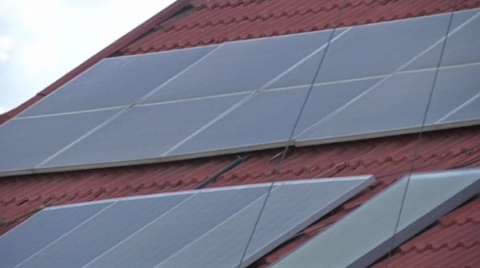
MACHAKOS COUNTY, Kenya (Reuters) — Greenpark, a residential estate located about 20 kilometers south of Kenya’s capital, Nairobi, is one of a handful of housing developments promoting solar powered homes in the country.
Founded in 2006 the 150-acre estate has 400 units all fitted with solar panels for water heating. Developers are currently working on the fifth phase of the scheme.
The panels are made locally and fitted by Steelstone Kenya, which has been contracted by the developers of the estate.
Each solar unit costs about 800 US dollars to install.
Arvinder Ghataura, Steelstone managing director says there is a growing demand for solar energy in the country and that his firm now installs over 3,000 panels for clients every year.
“The use of solar, with the developers are now, everyone is making sure that they install a solar system during the time of building, so this has worked to the advantage of solar contractors in Kenya and which in turn means more business for us but in the same time that doesn’t mean we start providing poor quality services, so as a company we always ensure that we give you good service and good quality,” said Ghataura.
Residents like Ruth Ng’ang’a say the panels have helped cut electricity costs by nearly half.
“Basically it is a very energy saving product that we have because we are able to have hot water throughout the day depending on the usage and also in the night, yeah so we don’t have to put power on, we always have hot water whichever time you need during the day and normally we are able to use the water for washing for cleaning and also for the bathrooms,” she said.
Kenya is one of the countries leading Africa’s push toward solar energy use.
Experts say fast-dropping costs for solar power, combined with plenty of sun and a huge need for cheaper electricity holds huge economic potential. Better transmission and storage of solar energy could save countries billions.
Experimentation with various solar uses like lighting is fast expanding into broader use of renewable power for business, according to energy experts.
At Garden City mall in Nairobi, 3,366 solar panels fitted on carports generate about 1450mgh of solar electricity per year used to power escalators, electrical appliances and for lighting in the retail complex.
East Africa’s largest economy relies heavily on renewable energy such as hydro power and geothermal for its electricity, which is expensive and often reflects on consumers’ monthly energy bills.
The country’s Energy Regulatory Commission (ERC) has said property developers must now install solar water heaters in buildings where occupants use over 100 liters of hot water a day by May this year, following a regulation that came into force in 2012.
Ernest Chitechi is the corporate services manager at Kenya Climate Innovation Centre, an organization that promotes clean energy technologies.
“Solar energy is viable in Kenya, Kenya lying on the equator has some of the best solar installations in the globe, I think it is about 4.5kilowatts per hour which is actually very good and if the solar energy is well harnessed it will actually help in stability of our grid, particularly when we have solar during the day,” said Chitechi.
But solar can have high upfront costs, compared to traditional fuels although experts argue that the technology creates benefits for years to come.
For more Kenyans to access solar energy, authorities need to have sound regulatory frameworks to help draw in more local investors and lower costs.
“It is a little bit expensive for the equipment and all this but if the government has a good will to subsidize then you will see the benefit of the registration that they have passed,” said Peter Wainaina, a Nairobi resident.
Kenya also plans to launch a $150 million project this year to bring solar electricity to markets, schools, shops and homes in poor, off-grid areas without existing power access.








